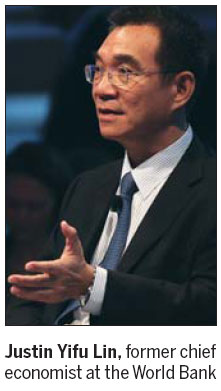
China can keep a brisk pace of growth over the coming decades by joining the global economic stimulus plan for infrastructure construction, Justin Yifu Lin, the former chief economist at the World Bank, said at the ongoing sixth Annual Meeting of the New Champions 2012?in Tianjin.

Because effects from the global financial crisis may continue, both developed and emerging economies should cooperate on a worldwide "Marshall Plan" for expanded investment in fixed assets, especially in infrastructure, Lin said.
"A new round of economic stimulus in China should depend on fiscal measures rather than sharply easing monetary policies," he said, noting the negative effects of the 4 trillion yuan injection of cash in 2008.
"The country can retain an average annual growth rate of 8 percent over the next 20 years" if economic restructuring can be steadily strengthened, Lin said.
His comments showed a rare optimism among economists about the world's second-largest economy as economic indicators continued to deteriorate in August.
According to the National Bureau of Statistics, the nation's growth in industrial output in August slowed to a 39-month low of 8.9 percent.
Also showing the manufacturing economy has deteriorated, the purchase management index of operations in the manufacturing sector fell to 49.2 in August, the lowest level since December 2011.
Chinese economists predict that growth may continue to cool in the third quarter from the second quarter's 7.6 percent.
 |
"The government is already taking additional measures to stabilize economic growth, especially with new investment projects," Huang said.
From a global view, regions that can provide more investment opportunities include countries in Latin America, Africa and South Asia where construction of highways, urban railway systems and environment protection projects are needed, Lin said.
Compared with the growth-support method of boosting consumption, encouraging investment is more sustainable, which can expand domestic demand and create new job opportunities, the former World Bank economist said.
 Washington to remain focused on Asia-Pacific
Washington to remain focused on Asia-Pacific RQFII target blue chips amid bear market
RQFII target blue chips amid bear market Australian recall for top two exporters
Australian recall for top two exporters China fears new car restrictions
China fears new car restrictions